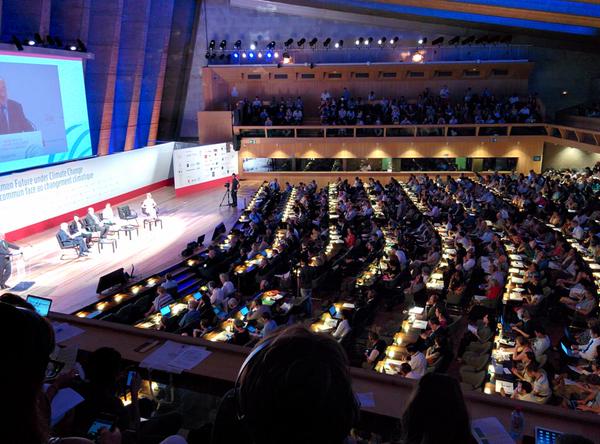STEPS member Adrian Ely is at the Our Common Future conference in Paris, and has sent this blogpost looking back on Day 1. The conference runs until Friday. Read our feature on climate, COP21 and sustainability here.
The opening plenary of the ‘Our Common Future under Climate Change’ conference – the biggest international meeting of scientists in the run-up to COP21 – was given over to the politicians. The second plenary was dominated by scientists. With all the talk of the science-policy interface, I hope they found the time to talk to each other in the coffee breaks.
In December, Paris will host the 21st Conference of the Parties to the United Nations Framework Convention on Climate Change (COP21). I’m at the UNESCO headquarters in Paris with a number of STEPS Centre colleagues and nearly 2000 researchers from around the world to discuss the latest findings of relevance to the COP, building on the IPCC 5th Assessment Report (AR5).
Science and policy
This morning’s sessions turned first to politics and featured politicians from the international and national levels. One of the messages from UNESCO was that our future depends on science (including social sciences and humanities) and policy. One of the main messages from Ban Ki-moon, in a presentation read by Michel Jarraud (General Secretary, World Meteorological Organisation), was that he would be drawing on advice from his scientific advisory board (which is led by UNESCO and aims to strengthen connection between science and policy) in the run-up to the COP.
Then we turned to domestic politics. President Hollande had originally been due to make an opening address, but was taken up by urgent meetings on Greece and the Euro (as one speaker said, the political climate in Europe is changing too). Two French ministers made presentations instead.
Najat Vallaud-Belkacem, French Minister of Education and Research, made an eloquent and impassioned speech, turning on the emotion with a clear message delivered straight to the scientists in the room (especially those in the IPCC). She relayed the heroic adventure of the glaciologist, spending months on end in the polar regions gathering data, before returning to their family and friends, and to deliver their analysis to the decision-makers. The glaciologists loved it. Without science, she said, we would not have had Rio or Kyoto, and relaying her thanks to the scientific community for guiding the way, she made a lot of friends in the room.
Not whether to act, but how
Next, Ségolène Royal (Minister of Ecology, Sustainable Development and Energy) also used the opportunity to address this specific audience, delivering another targeted speech that encouraged scientists to speak clearly and independently to the decision-makers at the Conference of the Parties.
Royal also stressed that the question was not whether to act (which science showed was now clear), but, interestingly, how. Turning to the role that technologies can play in responding to the climate challenge, she called for innovations to be implemented in the most democratic way possible. This perhaps illustrated her years of experience working at the science-policy interface, and the knowledge that the decision-makers in December will not be able to simply “follow scientific advice”.
The chair, Jean Jouzel (Intergovernmental Panel on Climate Change and CFCC15 High Level Board Chair) acknowledged the speakers’ contributions, and stressed how important it was for the scientific community to have the support of the politicians
‘The voice of science’
With the second session and the scientists taking the stage, we moved from emotion and democracy to slides, numbers, graphs and (if the audio visual system could have handled it) atmospheric circulation animations.
The Chair, Gordon McBean (President, International Council for Science) said that it was important to hear the voice of science again and invited Thomas Stocker (University of Bern, nominated by Switzerland for the IPCC chair) to the stage. Providing a synthesis of IPCC Assessment Report 5, he explained how “millions of measurements and large-scale observation programmes” had been converted to 7579 pages of text. In order to provide a summary for policy-makers, this had been condensed down into 31 page summary for policy makers… and this document could itself be further shortened so that the main messages fitted on just 1 sheet of paper (admittedly on both sides). There was, he said, “no excuse not to understand what the messages are.”
The summary report (pdf) outlines adaptation and mitigation pathways that will reduce the severe, widespread and long-term, irreversible impacts that are likely under ‘business as usual’ scenarios.
However, whilst describing a number of options, and stressing that “no single option is sufficient by itself,” the report does not provide a definitive answer to the “how” question raised by Ségolène Royal.
It points to “common enabling factors” that “include effective institutions and governance, innovation and investments in environmentally sound technologies and infrastructure, sustainable livelihoods and behavioural and lifestyle choices”. This, and the need to proceed “in the most democratic way possible”, is where climate science and climate politics meet, and will be the focus of various events that I and STEPS Centre colleagues are involved in over the next three days.
More on climate
Our feature on Climate change, COP21 and sustainability
Image via @BlaneHarvey (Twitter)
